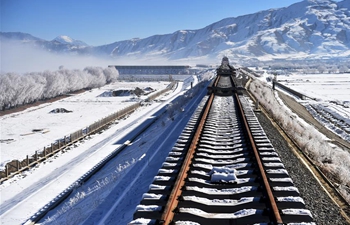WASHINGTON, Dec. 28 (Xinhua) -- The partial shutdown of the U.S. federal government is set to drag into next week after lawmakers made little progress Thursday in resolving a budgetary stalemate over funding for the border wall proposed by President Donald Trump.
A nearly empty Senate convened for just a few minutes Thursday afternoon, only to announce that there would be no action in the upper chamber and that it would renew budget deliberations next Wednesday, a day before a divided Congress will be sworn in.
House Majority Whip Steve Scalise also advised members that "no votes are expected" in the lower chamber this week.
About a quarter of the federal government shut down last Friday midnight as a result of an impasse between the White House and the Congress over whether to provide billions of U.S. dollars for the construction of a U.S.-Mexico border wall, a promise Trump made during the 2016 presidential campaign.
Trump and his conservative allies have insisted that the border wall is essential to addressing illegal immigration and drug trafficking, while Democrats have slapped the proposal as an "inefficient, unnecessary and costly" solution to strengthening border security.
Both sides tried to pin blame on the other over the stalemate on Thursday.
In a statement released after the Senate session, the White House accused Democrats of "openly choosing to keep our government closed to protect illegal immigrants rather than the American people," adding the president will not sign a proposal "that does not first prioritize" the country's safety and security.
"No end in sight to the President's government shutdown," Senator Dick Durbin of Illinois tweeted. "He's taken our government hostage over his outrageous demand for a $5 billion border wall that would be both wasteful and ineffective."
Drew Hammill, deputy chief of staff to House Democratic leader Nancy Pelosi, tweeted that Democrats, when taking over the House on Jan. 3, "will act swiftly to end" the shutdown and "will fight for a strategic, robust national security policy, including strong and smart border security."
According to a Reuters/Ipsos poll released Thursday, 47 percent of Americans hold the president responsible for the shutdown, the third time for this year, while 33 percent blame Democrats in Congress. Seven percent of Americans blame congressional Republicans.
The partial shutdown is affecting nine of 15 cabinet-level departments and dozens of agencies. More than 420,000 federal employees deemed essential have to work without pay during the shutdown, and roughly 380,000 have been given leave without pay.
Trump claimed earlier Thursday that most of the federal workers furloughed or forced to work without pay due to the shutdown are Democrats, without providing any proof. He has also claimed that "many" federal workers wanted the shutdown.
Refuting Trump's claim, Jeffrey David Cox Sr., president of the American Federation of Government Employees, which represents over 700,000 federal employees, said in a statement that members of the union "are eager to get back to work."
"They unequivocally oppose using shutdowns as a means of resolving policy disputes. This is not about a wall. This is about 800,000 real people with real families and real bills to pay," said the statement.
Julie Burr, a 49-year-old government contractor identified as an administrative assistant at the Department of Transportation in Kansas City, Missouri, tweeted that she will get "no pay for any days that this shutdown goes on."
"I am a single mom in a panic mode. Picking up extra shifts at my 2nd job but won't pay the rent!" Burr wrote with hashtag ShutdownStories.
According to U.S. Secretary of Agriculture Sonny Perdue, 61 percent of the Department of Agriculture's employees would continue to work through the first week of the shutdown, but that number would decrease if the shutdown continues.
The U.S. State Department said in a statement that "consular operations, including visa and passport services, domestically and abroad will remain open as long as there are sufficient fees to support operations."
"If a domestic agency is located in a U.S. government affected by a lapse in appropriations, the facility may become unsupported and therefore unavailable to the public," the statement added.
Standard & Poor's, an American credit rating firm, estimated that the shutdown could trim 1.2 billion dollars a week from U.S. gross domestic product, according to The New York Times.
The shutdown is among a bunch of factors that have contributed to worries over the outlook for the U.S. economy in 2019.
The House passed a bill last week with 5.7 billion dollars for border security, including money for Trump's border wall, but it was viewed as dead on arrival in the Senate. Earlier that week, the Senate passed legislation to keep border security funding at current levels, with no money for the wall, which the president rejected.
"Whatever it takes, we need a wall," Trump said during his unannounced visit to U.S. troops in Iraq on Wednesday.













